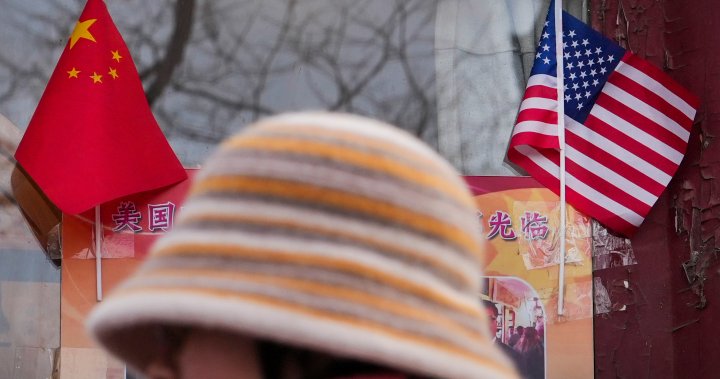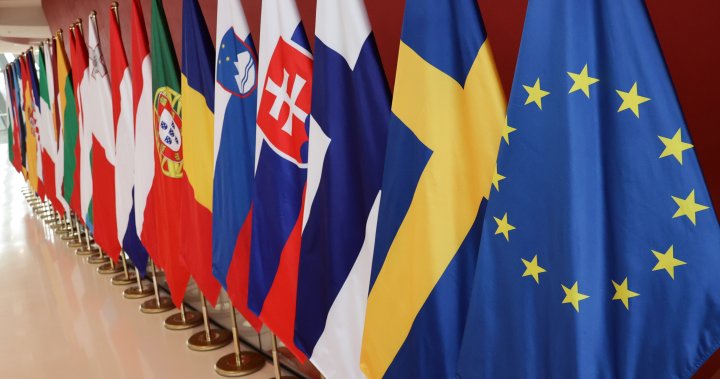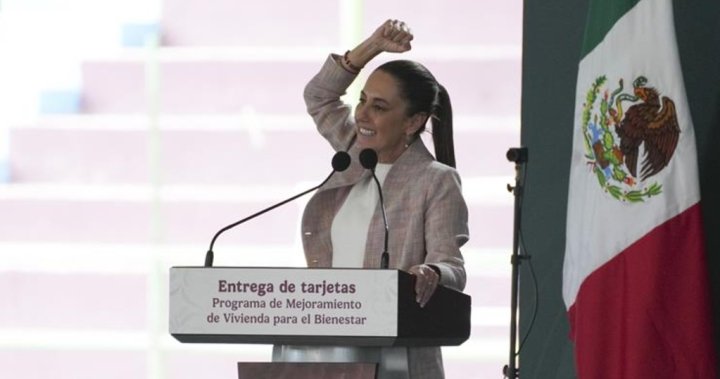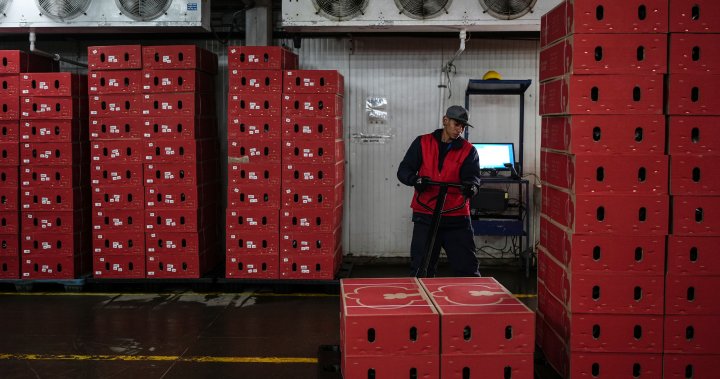Israeli strikes kill at least 22 people in Beirut, 27 in Gaza – National
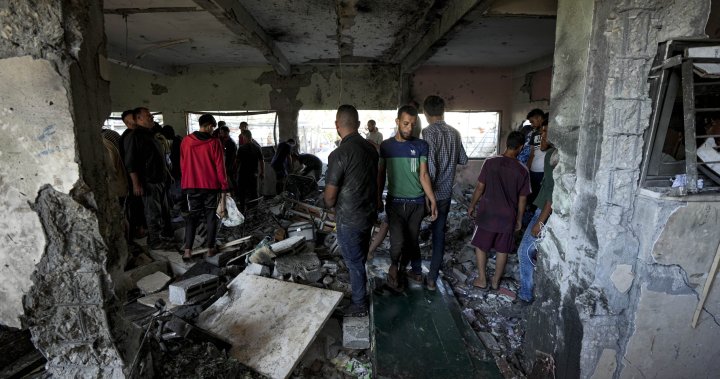
Israeli airstrikes hit central Beirut on Thursday evening, killing at least 22 people and wounding dozens, Lebanon’s health ministry said, leaving two neighborhoods smoldering and further escalating Israel’s bloody conflict with Iran-backed Hezbollah militants in Lebanon.
The strikes apparently targeted two residential buildings in separate neighborhoods of western Beirut, according to an AP photographer at the scene, bringing down one multi-story building and wiping out the lower floors of another.
The Israeli military said it was looking into the reported strikes on the Lebanese capital. Israeli airstrikes have been far more common in Beirut’s tightly packed southern suburbs, where Hezbollah bases many of its operations.
Thursday’s strikes followed a year of tit-for-tat exchanges between Hezbollah and Israel that boiled over into all-out war in recent weeks, with Israel carrying out waves of heavy strikes across Lebanon and launching a ground invasion. Hezbollah has expanded its rocket fire to more populated areas deeper inside Israel, causing few casualties but disrupting daily life.
The attack came the same day as Israeli forces fired on United Nations peacekeepers in southern Lebanon and wounded two of them. The attack drew widespread condemnation and prompted the Italian Defense Ministry to summon Israel’s ambassador in protest.
Before the latest Beirut strikes, Lebanon’s crisis response unit said Israeli attacks over the past day had killed 28 people, bringing the total to 2,169 killed in Lebanon since the war erupted last October.

Hezbollah attacks have killed 28 civilians in northern Israel since the war began, as well as 39 Israeli soldiers, including both in northern Israel since last October and in southern Lebanon since Israel’s ground invasion that has displaced 1.2 million people in Lebanon.
Even as attention has shifted to Israel’s war against Hezbollah in Lebanon and rising tensions with Iran, Israel has continued to strike at what it says are Palestinian militant targets across the Gaza Strip.
Earlier on Thursday, an Israeli strike on a school sheltering displaced people in central Gaza killed at least 27 people, Palestinian medical officials said. The Israeli military said it targeted Palestinian militants, but people sheltering there said the strike hit a meeting of aid workers.
Israeli strikes hit central Beirut
Witnesses reported a large number of ambulances and people gathering around damaged buildings at the two sites that were hit in central Beirut.
The Lebanese Health Ministry said 22 people were killed and 117 others wounded, without elaborating on their identities. It wasn’t immediately clear what was targeted. Recent Israeli airstrikes in neighborhoods adjoining Beirut, in particular the city’s densely populated southern suburbs, have killed Hezbollah’s leader, Hassan Nasrallah, and other senior commanders.
In the neighborhood of Ras al-Nabaa, the airstrike appeared to have hit the lower half of an eight-story apartment building, setting off a series of loud explosions. A second Israeli strike, in the western area of Burj Abi Haidar, collapsed an entire building, which was engulfed in flames.
Israeli ground troops invaded southern Lebanon on Sept. 30 and have been battling Hezbollah in deadly combat since. Israel says the ground invasion, which has so far focused on a narrow strip along the border, is aimed at pushing the militants back so that tens of thousands of Israelis can return to their homes in the north.

Get daily National news
Get the day’s top news, political, economic, and current affairs headlines, delivered to your inbox once a day.
Hezbollah began firing rockets into Israel on Oct. 8, 2023, in support of Hamas and the Palestinians, drawing Israeli airstrikes in retaliation.

Hezbollah kept up rocket fire into Israel on Thursday, setting off air raid sirens in parts of northern Israel. Several drones heading toward Israel were intercepted, the military said.
Iran — which supports Hamas, Hezbollah and other armed groups across the region — launched some 180 ballistic missiles at Israel last week in retaliation for the killing of top Hamas and Hezbollah militants.
Israeli Defense Minister Yoav Gallant said Wednesday that its response to the Iranian missile attack will be “lethal” and “surprising,” without providing further details, as Prime Minister Benjamin Netanyahu spoke with President Joe Biden.
Israel’s Channel 12 reported that Israel’s security cabinet would convene Thursday night to discuss the country’s response.
UN peacekeepers caught in intensified fighting in Lebanon
The U.N. peacekeeping mission in Lebanon, known as UNIFIL, said in a statement that its headquarters and positions “have been repeatedly hit” by Israeli forces. It said an Israeli tank “directly” fired on an observation tower at the force’s headquarters in the town of Naqoura, Lebanon, and that soldiers had attacked a bunker near where peacekeepers were sheltering, damaging vehicles and a communication system. It said an Israeli drone was seen flying to the bunker’s entrance.
The Israeli military acknowledged opening fire at a U.N. base in southern Lebanon on Thursday and said it had ordered the peacekeepers to “remain in protected spaces.”
The two UNIFIL soldiers wounded are Indonesians, according to Italy’s Foreign Minister Antonio Tajani.
UNIFIL, which has more than 10,000 peacekeepers from dozens of countries, was created to oversee the withdrawal of Israeli troops from southern Lebanon after Israel’s 1978 invasion. The United Nations expanded its mission following the 2006 war between Israel and Hezbollah, allowing peacekeepers to patrol a buffer zone set up along the border.
Israel accuses Hezbollah of establishing militant infrastructure along the border in violation of the U.N. Security Council resolution that ended the 2006 war. It has warned people to evacuate from dozens of communities in southern Lebanon, many of which are outside the buffer zone.
The European Union’s top diplomat, Josep Borrell, sharply condemned Israeli strikes that hit UNIFIL positions as “an inadmissible act, for which there is no justification.”
From Italy, which has about 1,000 soldiers deployed as part of UNIFIL, Defense Minister Guido Crosetto went further, claimed Israel deliberately targeted the UNIFIL base in southern Lebanon in strikes that “could constitute war crimes.”
Several other countries, including France, Spain and Jordan, denounced the Israeli attacks.

The U.N. peacekeeping chief, Jean-Pierre Lacroix, said last week that peacekeepers would stay in their positions on Lebanon’s southern border despite Israel’s request to vacate areas before it launched its ground operation against Hezbollah.
Crosetto endorsed that, saying that “the U.N. and Italy cannot accept orders from the Israeli government.”
Aid group says staff killed in strike on school
The Israeli strike in the central Gaza city of Deir al-Balah killed 27 people, including a child and seven women, according to the Al-Aqsa Martyrs Hospital, where the bodies were brought.
An Associated Press reporter saw ambulances streaming into the hospital and counted the bodies, many of which arrived in pieces.
The Israeli military said it targeted a militant command and control center inside the school, without providing evidence. Israel has repeatedly attacked schools that were turned into shelters in Gaza, accusing militants of taking cover in them.
Witnesses said the strike occurred while school managers were meeting with representatives of an aid group in a room normally used by Hamas-run police who provide security. They said there were no police in the room at the time.

The Palestinian branch of Terre des Hommes, a Swiss aid group, said in a statement that members of one of its children’s health teams were killed in the strike, without specifying how many.
“There were no militants. There was no Hamas,” said Iftikhar Hamouda, who had fled from northern Gaza earlier in the war.
“We headed to tents. They bombed the tents … In the streets, they bombed us. In the markets, they bombed us. In the schools, they bombed us,” she said. “Where should we go?”
The Hamas-run government operated a civilian police force numbering in the tens of thousands. They largely vanished from the streets after the start of the war as Israel targeted them with airstrikes, but plainclothes Hamas security personnel still exert control over most areas.
Hamas has continued to launch attacks on Israeli forces more than a year after the Palestinian militants’ Oct. 7 attack on southern Israel that ignited the war.
The militants stormed into Israel in that attack, killing some 1,200 people, mostly civilians, and abducting around 250 others. They are still holding around 100 captives, a third of whom are believed to be dead.
Israel’s offensive has killed over 42,000 Palestinians, according to local health authorities, who do not say how many were fighters but say women and children make up more than half of the fatalities. The war has destroyed large areas of Gaza and displaced around 90% of its population of 2.3 million people, often multiple times.





